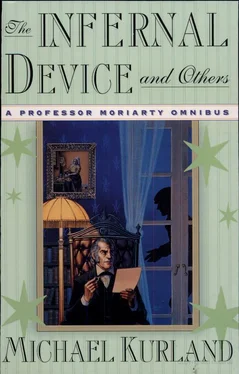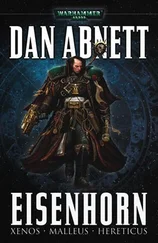"Let us hope that the authorities remain as puzzled as you are," Moriarty said. He reached to the side of his desk and picked up a small bronze statuette that Barnett had never noticed before. "May the luck of Uma stay with us."
"Uma?" Barnett asked.
"A Hindu goddess," Moriarty told him. "Consort of Shiva. A fascinating, complex religion, that."
"That's not part of the, ah, loot, is it?" Barnett asked, looking alarmed.
"Never mind," Moriarty said. "It's not important. Go to bed."
"Tell me how you did it," Barnett said. "Did what?"
"The robbery. Tell me how you removed two tons of jewelry from a locked wagon while it was surrounded by armed guards." Moriarty considered. "Briefly," he said. Barnett nodded.
"Like most things that seem impossible," Moriarty said, "it was actually quite simple. I'm afraid that telling you will ruin the effect."
"Please, Professor," Barnett said. "After all, I was part of it."
"True," Moriarty admitted. "And a very important part, although you knew not what you did."
"What did I do?"
"The problem was," Moriarty said, "to get someone into that sealed wagon."
Barnett nodded. "That was indeed the problem," he agreed. "And you did it," Moriarty said. "I did?"
"With a brilliant bit of misdirection. You see, I already had an agent in place: one of the Indian porters was my man. He arranged to be among the crew who carried the third treasure chest into the wagon."
"And then?"
"And then, while you drew the momentary attention of everyone with your clever little wager, he merely stayed behind in the wagon while the others left."
"But that's impossible," Barnett said. "Lord East inspected the wagon after it was loaded, and there was no place for anyone to hide. The walls were even covered with fabric."
"Indeed," Moriarty said. "And an interesting quality of any such solid-color material is that from more than two feet or so distant, you cannot tell how far away you are from any piece of identical fabric without an external referent."
"What does that mean?" Barnett asked. "I confess that you've lost me."
"Picture a table, placed, let us say, five feet in front of a fabric curtain," Moriarty said. "You are staring at the table with the curtain behind it. Wherever you look you see the curtain — above the table, to the right of the table, to the left of the table, between the legs of the table. Correct?"
"I guess so."
"I know, it sounds too obvious to be worth stating. But now, supposing I take a piece of fabric that is identical to the curtain and fasten it between the back legs of the table, from the rim of the table to the floor. When you look at it, you'll think you see the back curtain, but in reality you'll be staring at a piece of fabric that is five feet closer to you."
"I see," Barnett said.
"And between that fabric and the actual curtain," Moriarty said, "I could hide a man, a donkey, a small cannon, or anything else that would fit, and you'd be willing to swear that you could see the whole area clearly, and there was nothing there."
Barnett thought this over. "So that's how you did it," he said.
"That's how you did it," Moriarty replied. "You distracted the crowd for long enough for my agent to drop a fabric curtain that he had rolled around one of the carrying bars for the chest. There he was, crouched down, in the supposedly empty area between the chest and the wall. Lord East thought he could see the far wall, but he couldn't."
"So the wagon was sealed with the man inside."
"Just so."
"But how did the man get the treasure out?"
"One piece at a time."
"And the guards?"
"It was invisible to the guards."
"You mesmerized them?"
Moriarty chuckled. "Listen, and I shall describe the rest of the operation," he said. "The agent in the goods wagon waited until the train was in motion. Then he pried up a one-foot-square section of the sheet-metal floor with a device that I had fabricated, which looks a great deal like an oversized tin opener. After which he took a small keyhole saw and leisurely cut out the underlying boards. For this task he was allowed two hours.
"The next step was to stop the train at a precisely predetermined point."
"A snap," Barnett commented.
"Indeed it was," Moriarty agreed, "if I correctly interpret that barbaric expression. Especially a 'snap' if you consider that the engine driver was almost certainly not going to overrun a danger signal on the semaphore repeater. And if you consider that the railways use a 'positive' system of signaling, which assures that the normal condition of the signal arm will be 'danger.' This means that if any natural misfortune occurs to the semaphore apparatus, it assumes the 'danger' position rather than the 'safety' or 'caution' positions."
"A natural misfortune?"
"Correct. In this case, a severely corroded cable accidentally snapped. The maintenance division must be sternly spoken to. A 'snap,' as you say. There are substances known to chemists which can incredibly speed up the corrosion of any metal object."
"And the signal swung to 'danger'?"
"Just so. And the engine driver of Lord East's caravan stopped the train. What else was he to do?"
"And then?"
"A hatch opened between the metals — what you would call the rails — in the track bed. Carefully disguised as two wooden sleepers and the space between, the hatch covered a specially constructed chamber buried in the embankment. The hatch was so placed as to be directly beneath the hole in the floor of the wagon when the train halted at the signal."
"That simple?" Barnett marveled. "And the treasure was just handed out?"
"No, no, the stop would not be nearly long enough for that," Moriarty said. "I estimated three minutes. As it happened, they took seven, but even that would not have been nearly long enough for the transfer of that bulk of boodie. No, Mr. Barnett, what happened at this carefully prearranged pause was that certain materials were handed up into the wagon. And then a second man joined the one who was already there.
"This second man was an expert in the ancient craft of reproducing seals. And he brought with him the needed equipment — to wit, a spoon, a candle, and a loaf of bread."
Barnett sat back down on the couch. Moriarty had obviously succeeded in his attempt to distract his assistant from his troubles, at least for the moment. "A loaf of bread?" Barnett asked.
"The best way to duplicate a wax seal in anything like a reasonable length of time," Moriarty said, "is to take an impression of it with moist bread which you have kneaded between your palms. Done by an expert, it's as effective as any other method. What the expert does in this case is to use a hot wire to separate the seal from the treasure chest, first making a bread impression of it in case it breaks while being removed."
"Yes, but why bother?" Barnett asked. "Why not just break open the chests?"
"It adds an extra element of confusion," Moriarty said. "It is my experience that a crime should be either so simple that there is no place to look for a solution, or so confusing that there are too many places to look. In this case, I chose the latter."
"How do you mean, Professor?"
Moriarty thought for a second. "In a simple crime," he explained, "you know all the elements, but they take you nowhere. A man is hit on the head, and his purse is taken. When he comes to, there is nobody around. You know everything that happened, but unless he recognized his assailant, it is virtually hopeless to try to recover the purse.
"In a complex crime, there are so many factors to trace down that much time is lost before you find out which are pertinent. The seals are broken on the chests, and they are found to be empty. But you don't know when the treasure was removed. Before the chests were loaded on the train? After the train left Plymouth? After it arrived at Hampton Court? Each of these must be investigated. It confuses things, you see."
Читать дальше












